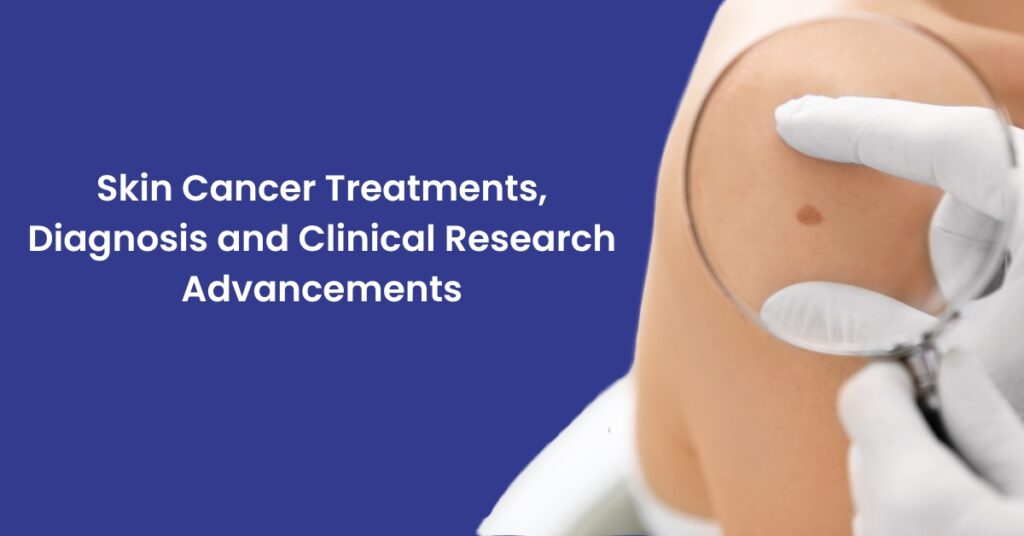Skin Cancer Treatments, Diagnosis and Clinical Research Advancements

Table of Contents
Skin cancer is one of the most common cancers, affecting millions of people each year. However, advancements in diagnosis, treatment, and clinical research are bringing new hope to patients and their families. Early detection is key, and with modern diagnostic tools, we can identify skin cancer more accurately and less invasively than ever before.
Treatment options have also progressed, with targeted therapies and innovative immunotherapies like adoptive cell therapy making significant strides. In this blog, we’ll delve into the latest in skin cancer diagnosis and treatment, and explore how cutting-edge research is paving the way for improved outcomes and brighter futures for those affected by this disease.
Diagnosis of Skin Cancer
Diagnosing skin cancer involves a thorough examination by a dermatologist who specializes in skin conditions. The process includes several steps to ensure an accurate diagnosis and an appropriate treatment plan. Here’s a detailed look at how skin cancer is diagnosed:
- Initial Examination: During the initial step, the dermatologist will ask about any changes in existing moles, freckles, or new skin growths. They will then conduct a comprehensive skin examination, inspecting all areas of your body, including the scalp, ears, palms, soles, and between the toes.
- Dermatoscopy: To get a closer look at suspicious skin lesions, a dermatologist may use a dermatoscope, a handheld device that magnifies the skin. This tool helps in distinguishing benign from malignant lesions by revealing patterns and structures not visible to the naked eye.
- Skin Biopsy: If skin cancer is suspected, the next step is a biopsy. This involves removing a tissue sample for lab analysis. A pathologist examines the sample under a microscope to identify cancerous cells and determine the type and extent of the cancer, aiding in staging and treatment planning.
- Imaging Tests: For advanced stages of skin cancer, especially melanoma, additional imaging tests may be required to determine if the cancer has spread to other parts of the body. These tests might include X-rays, CT scans, MRI scans and PET scans.
- Blood Tests: These are performed to assess overall health and help plan treatment, especially in advanced melanoma cases. Blood tests can provide information about how well organs are functioning and may detect elevated levels of lactate dehydrogenase (LDH), which can be associated with more advanced melanoma.
Skin Cancer Treatments
The treatment of skin cancer varies based on the type, stage, and location of the cancer. Here is a detailed overview of the common treatments:
- Excisional Surgery: In this procedure, the surgeon removes the cancerous tumor along with some surrounding healthy tissue to ensure all cancer cells are eradicated. This method is often used for basal cell carcinoma and squamous cell carcinoma and is effective in preventing recurrence.
- Mohs Surgery: This precise surgical technique involves removing the cancerous tissue layer by layer, examining each layer under a microscope until no abnormal cells remain. Mohs surgery is particularly useful for skin cancers in cosmetically sensitive areas like the face, ears, and neck, as it spares as much healthy tissue as possible.
- Cryotherapy: It involves applying liquid nitrogen to the cancerous tissue and freezing the cells. The frozen cancer cells eventually die and slough off as the skin heals. This method is often used for small, early-stage skin cancers and precancerous lesions like actinic keratosis.
- Curettage and electrodesiccation: In this procedure, the dermatologist uses a curette, a sharp, spoon-shaped instrument, to scrape away the cancerous tissue. Following this, an electric needle (electrodesiccation) is used to destroy any remaining cancer cells and control bleeding. This technique is commonly used for small basal and squamous cell carcinomas.
- Radiation Therapy: It uses high-energy beams, such as X-rays, to target and kill cancer cells. It is typically used for skin cancers that are difficult to treat with surgery, such as those located in areas that are hard to operate on or in elderly patients who may not tolerate surgery well.
- Chemotherapy: It uses drugs to destroy cancer cells. It works by targeting cells that divide rapidly, a common characteristic of cancer cells.
- Topical chemotherapy: This involves applying anti-cancer drugs directly to the skin in the form of a cream or lotion. It is commonly used for cancers confined to the top layer of the skin, such as superficial basal cell carcinoma.
- Systemic chemotherapy: This treatment is used when skin cancer has spread to other parts of the body. The anti-cancer drugs are administered orally or intravenously, allowing them to travel through the bloodstream to reach cancer cells throughout the body.
- Immunotherapy: It involves the use of medications that help the body’s immune system recognize and attack cancer cells. It is particularly effective for advanced melanoma. Drugs such as checkpoint inhibitors (e.g., pembrolizumab, nivolumab) are commonly used to enhance the immune response against cancer cells.
- Photodynamic Therapy (PDT): In PDT, a photosensitizing agent is applied to the skin cancer and absorbed by the cancer cells. After an appropriate absorption period, the area is exposed to a specific wavelength of light, activating the drug and destroying the cancer cells. PDT is effective for treating superficial skin cancers and precancerous lesions.
- Targeted Therapy: It involves drugs that specifically target genetic mutations or abnormalities within cancer cells. For example, drugs like vemurafenib and dabrafenib target the BRAF mutation commonly found in melanoma cells. This treatment is used primarily for advanced melanoma that has specific genetic alterations.
Each treatment plan is tailored to the patient’s specific condition, taking into account the type, stage, and location of the cancer, as well as the patient’s overall health and preferences. Often, a combination of treatments may be employed to ensure the best possible outcome.
Clinical Research in skin cancer
Clinical research in skin cancer is crucial for advancing prevention, early detection, and treatment strategies. It includes studies ranging from basic research on genetic and molecular mechanisms to clinical trials testing new therapies, such as targeted treatments and immunotherapies. Recent advances like liquid biopsies offer non-invasive diagnostic options, while research into personalized medicine tailors treatments to individual patient profiles.
One significant development is adoptive cell therapy (ACT), a type of immunotherapy being tested for metastatic melanoma. Tumor-infiltrating lymphocyte (TIL) therapy, a form of ACT, received FDA approval in 2024 for advanced melanoma that has recurred after treatment with either targeted therapy or an immunotherapy drug. TIL therapies involve collecting immune cells from a patient’s tumors, enhancing their cancer-fighting abilities, and infusing them back into the patient. The approved TIL therapy, lifileucel (Amtagvi), is the first approved cellular therapy for any solid tumor.
This research aims to improve survival rates, enhance quality of life, and develop effective preventive measures, ultimately transforming the management of skin cancer and providing hope for better patient outcomes.
Your skin matters—make an appointment at Pi Health Cancer Hospital for a comprehensive check-up!
Conclusion:
Lastly, the importance of early detection cannot be overstated, as it lays the foundation for successful intervention. The evolution of treatment options, from targeted therapies to cutting-edge immunotherapies like adoptive cell therapy, demonstrates the significant strides being made in the fight against skin cancer. Ongoing clinical research continues to break new ground, offering innovative solutions and improving the standard of care. By staying informed and vigilant, we can better navigate the challenges of skin cancer and embrace the hope that these medical advancements bring. Together, with continued research and awareness, we can work towards a brighter, cancer-free future.
References:
About Author
Dr. A. Venugopal
MD (General Medicine), DM (Medical Oncology), MRCP – SCE Medical Oncology (UK), ECMO (Switzerland).
Dr A. Venugopal is One of the best medical oncologist and Hemato Oncologist in hyderabad, currently serving as the Head of the Department and Senior Medical Oncologist, Hemato Oncologist at Pi Health Cancer Hospital in Gachibowli, Hyderabad. He brings over 15 years of extensive experience in the field of Oncology.


Saved as a favorite, I really like your site
thank you